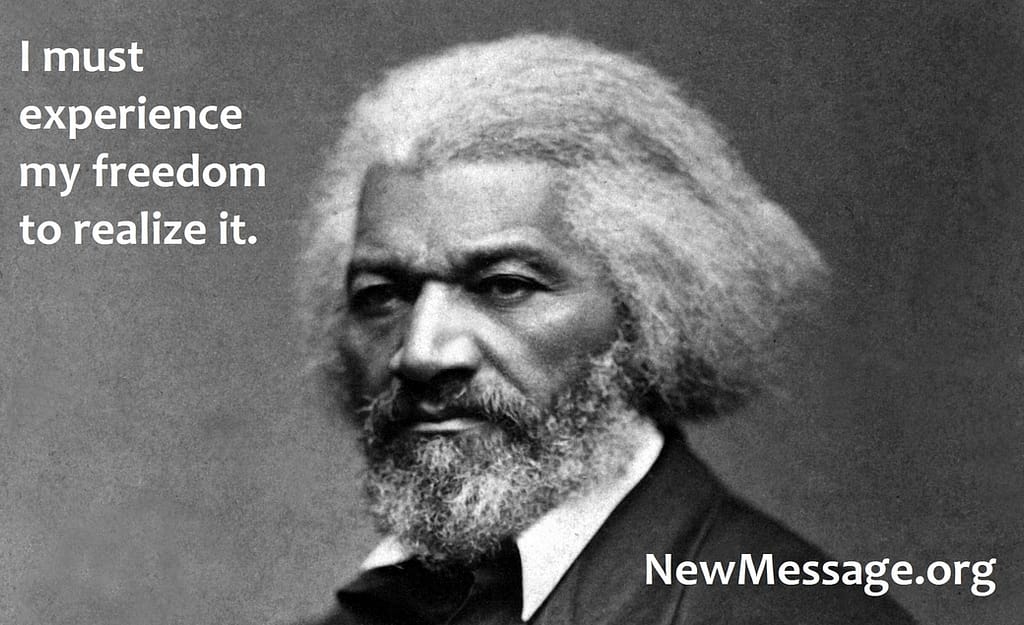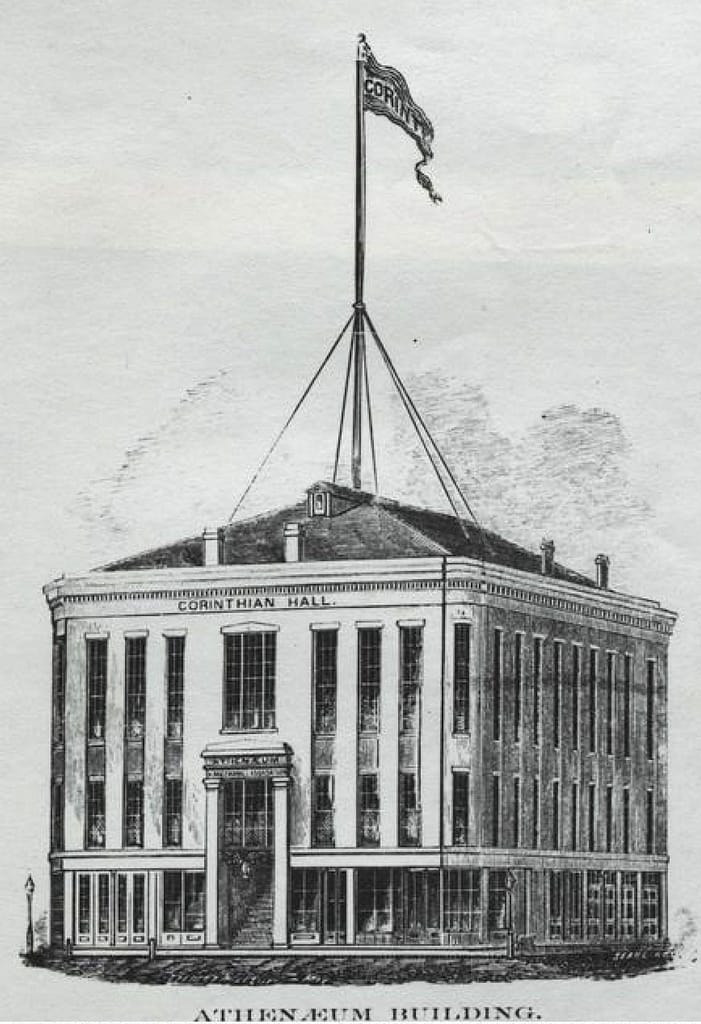
Some of you might not be familiar with American abolitionist Frederick Douglass (1818-1895). He was born into slavery in the state of Maryland. He escaped to freedom in Philadelphia in 1838. He became a leader of the movement to abolish slavery in the United States. American poet Langston Hughes wrote this about him in the poem “Freedom’s Plow:“
Then a man said:
BETTER TO DIE FREE
THAN TO LIVE SLAVES
He was a colored man who had been a slave
But had run away to freedom.
And the slaves knew
What Frederick Douglass said was true.
God speed the year of jubilee

n July 5, 1852, Frederick Douglass gave a speech to the Rochester [New York] Ladies’ Anti-Slavery Society. We now know this speech as “What to the Slave is the Fourth of July?” I did not learn of this speech in any portion of my education as a child. I am pleased that many Americans are discovering it today. It is far too long to quote, but I will make an attempt at summarizing.
He took hope in the relative youth of the nation (76 years). He took hope that reformers like him and his audience had a chance to make a change in a young nation’s ways.
He pointed out that back in 1776, people with the audacity to say that England treated its colonies badly were considered “mischief, agitators and rebels, dangerous men.” The way abolitionists were treated in his day.

I consider Frederick Douglass to be an American prophet, as he encouraged Americans to embrace their founding principles. “I have said that the Declaration of Independence is the ring-bolt to the chain of your nation’s destiny; so, indeed, I regard it. The principles contained in that instrument are saving principles. Stand by those principles, be true to them on all occasions, in all places, against all foes, and at whatever cost.”
He elaborated on how the Founders gave all the love they could give in support of their Declaration and its truths.
The poem with the line “Trust no future, howe’er pleasant” is “A Psalm of Life” by Henry Wadsworth Longfellow. Longfellow wrote it in 1838. I believe it was well-known to the audience. The final verse says “Let us then, be up and doing/With a heart for any fate;/Still achieving, still pursuing,/Learn to labor and to wait.” We have work to do.
He says in prose what Langston Hughes later said in poetry “America was never America to me.” He speaks of the great lack of empathy, the great blindness, the great disappointment, the great hypocrisy. He referenced Psalm 137, the psalm of Hebrew captivity, multiple times in this speech.
This might be a good section to quote:
“Whether we turn to the declarations of the past, or to the professions of the present, the conduct of the nation seems equally hideous and revolting. America is false to the past, false to the present, and solemnly binds herself to be false to the future. Standing with God and the crushed and bleeding slave on this occasion, I will, in the name of humanity which is outraged, in the name of liberty which is fettered, in the name of the constitution and the Bible, which are disregarded and trampled upon, dare to call in question and to denounce, with all the emphasis I can command, everything that serves to perpetuate slavery-the great sin and shame of America!”
“I will not equivocate; I will not excuse;” were the words of abolitionist William Lloyd Garrison in the first issue of The Liberator in 1831.
He provides ample evidence to the proposition that anyone who contends that a slave is not a human being is engaged in self-deception.
These two paragraphs say “Haven’t we been over this countless times? That a slave is a human being? That slavery is wrong?”
“What, then, remains to be argued? Is it that slavery is not divine; that God did not establish it; that our doctors of divinity are mistaken? There is blasphemy in the thought. That which is inhuman, cannot be divine! Who can reason on such a proposition? They that can, may; I cannot. The time for such argument is past.
At a time like this, scorching irony, not convincing argument, is needed. O! had I the ability, and could I reach the nation’s ear, I would, to-day, pour out a fiery stream of biting ridicule, blasting reproach, withering sarcasm, and stern rebuke. For it is not light that is needed, but fire; it is not the gentle shower, but thunder. We need the storm, the whirlwind, and the earthquake. The feeling of the nation must be quickened; the conscience of the nation must be roused; the propriety of the nation must be startled; the hypocrisy of the nation must be exposed; and its crimes against God and man must be proclaimed and denounced.”
The “foreign slave-trade” had been outlawed in 1808. But alas, the “internal slave trade” was alive and well in 1852. The Fugitive Slave Act of 1850 made the US Government a party to the internal slave trade. Frederick Douglass might have wondered if an attempt would be made to return him to his former owners.
God speed the year of jubilee. In 1963, Martin Luther King, Jr. called out the religious leaders of Birmingham for their complicity with segregation and discrimination. He was following in the footsteps of Frederick Douglass in 1852. Douglass named names of the leading apologists for slavery in the Christian community.
“The LORDS of Buffalo, the SPRINGS of New York, the LATHROPS of Auburn, the COXES and SPENCERS of Brooklyn, the GANNETS and SHARPS of Boston, the DEWEYS of Washington, and other great religious lights of the land, have, in utter denial of the authority of Him, by whom they professed to he called to the ministry, deliberately taught us, against the example or the Hebrews and against the remonstrance of the Apostles, they teach ‘that we ought to obey man’s law before the law of God.'”
Abraham Lincoln would later say something in his Second Inaugural Address, that echoed Frederick Douglass’ bewilderment regarding the church. “It may seem strange that any men should dare to ask a just God’s assistance in wringing their bread from the sweat of other men’s faces but let us judge not that we be not judged.” The Bible speaks of “the mystery of iniquity” or “the secret power of lawlessness.” People can claim to be good, and not see evil practices in which they engage.
God speed the year of jubilee. After having provided ample evidence for the greatness of the hypocrisy, he reiterates the indictment:
“Fellow-citizens! I will not enlarge further on your national inconsistencies. The existence of slavery in this country brands your republicanism as a sham, your humanity as a base pretense, and your Christianity as a lie. It destroys your moral power abroad; it corrupts your politicians at home. It saps the foundation of religion; it makes your name a hissing, and a by word to a mocking earth. It is the antagonistic force in your government, the only thing that seriously disturbs and endangers your Union.”

God speed the year of jubilee. The exclamation point of the speech is a poem written by William Lloyd Garrison. I will do my part for freedom.
God speed the year of jubilee
The wide world o’er!
When from their galling chains set free,
Th’ oppress’d shall vilely bend the knee,
And wear the yoke of tyranny
Like brutes no more.
That year will come, and freedom’s reign,
To man his plundered rights again
Restore.
God speed the day when human blood
Shall cease to flow!
In every clime be understood,
The claims of human brotherhood,
And each return for evil, good,
Not blow for blow;
That day will come all feuds to end,
And change into a faithful friend
Each foe.
God speed the hour, the glorious hour,
When none on earth
Shall exercise a lordly power,
Nor in a tyrant’s presence cower;
But to all manhood’s stature tower,
By equal birth!
That hour will come, to each, to all,
And from his Prison-house, to thrall
Go forth.
Until that year, day, hour, arrive,
With head, and heart, and hand I’ll strive,
To break the rod, and rend the gyve,
The spoiler of his prey deprive —
So witness Heaven!
And never from my chosen post,
Whate’er the peril or the cost,
Be driven.
Even after fully demonstrating its rottenness, Frederick Douglass had hope for the United States in 1852. I am well-aware of the world’s difficulties. But I have hope for the world in 2020. Knowledge, the deeper spiritual intelligence that God has placed into every person, will not permit me to fall into despair. Let us, then, be up and doing, With a heart for any fate; Still achieving, still persuing, Learn to labor and to wait.
Welcome to Mystery of Ascension! We are students and advocates of the the New Message from God. We are members of a worldwide community. We seek to assist the world in successfully navigating difficult times ahead. We seek to assist the world in successfully emerging into a greater community of intelligent life. You will also find some poetry. Find out more about us here. Contact us here.
